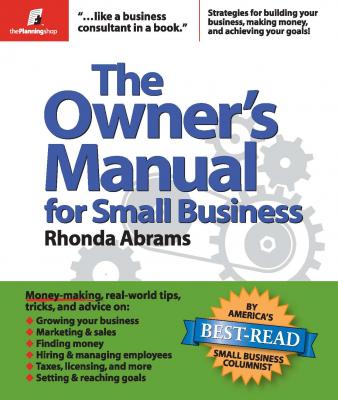The Owner's Manual for Small Business. Rhonda Abrams
Чтение книги онлайн.
Читать онлайн книгу The Owner's Manual for Small Business - Rhonda Abrams страница 8
 made the owners decide to close. They cited divorce, poor health, and most importantly, an unwillingness to make the immense time commitment necessary as reasons for shutting their doors.
made the owners decide to close. They cited divorce, poor health, and most importantly, an unwillingness to make the immense time commitment necessary as reasons for shutting their doors.
Survival Rates of Businesses
| First year: | 85% |
| Second: | 70% |
| Third: | 62% |
| Fourth: | 55% |
| Fifth: | 50% |
| Sixth: | 47% |
| Seventh: | 44% |
| Eighth: | 41% |
| Ninth: | 38% |
| Tenth: | 35% |
Source: Cognetics
In other words, they had what Dr. David Birch, former head of a research firm specializing in studying small business data, called the “I Had No Idea” syndrome. Would-be entrepreneurs don’t realize just how much is involved with running a business.
After running a business for a year or two, many people discover the effort is more than they anticipated. Suddenly, they’re the ones who have to keep the books, find the customers, pay the bills. When the reality sets in, many decide they’d rather return to the relative ease of having a job, and they close up shop.
“Historically about 95% of business endings have been because the owners have chosen to close rather than the financial condition of the company forcing a closing,” says Dr. Birch. “While about 500,000 businesses close each year, business failings are only about 50,000 … Once you’ve hit five years, your odds of survival go way up. Only two to three percent of businesses older than five shut down each year.”
The lesson? The best way to get over the first tough years is to be prepared. Find out as much as you can before you open your doors. Talk to people who run their own businesses, especially businesses similar to yours, and get a realistic understanding of the time, finances, and emotional resources necessary. Create a business plan. Keep your eyes open—not to the possibility of failure, but to the very real demands of running your own business.
Once you make it over the hurdle of adjusting to the entrepreneurial life, your chances of success are excellent. And Sheldon will be wrong again.
Your Entrepreneurial Type
Most business books and experts will tell you it takes a certain type of person to be an entrepreneur. They might say you have to be outgoing, risk-taking, and able to make sales.
It’s just not true. Look around: You may know someone who’s successful but is a grouch, hates to take a risk, or doesn’t get up before noon. They can be an entrepreneur—a successful entrepreneur at that—if they find a business that suits their entrepreneurial type.
What do I mean by “entrepreneurial type”?
When they first consider being in business for themselves, most people think about their interests. But that’s just a starting point. Let’s say you’re interested in antiques. Does that mean you should sell antiques, appraise them, or refinish them? Even if you want to sell antiques, does that mean owning a retail store, selling them on eBay, or finding bargains at flea markets and marking them up for sale to retail stores? Your interest is clear—antiques—but you’ve got a number of different ways to build a business around that interest.
Based on my experience with thousands of entrepreneurs, I’ve come up with a number of entrepreneurial types. Here are a few of the most common:
You can be a successful entrepreneur if you find a business that suits your entrepreneurial type.
So just about anyone can be an entrepreneur—a successful entrepreneur. The key is figuring out what entrepreneurial